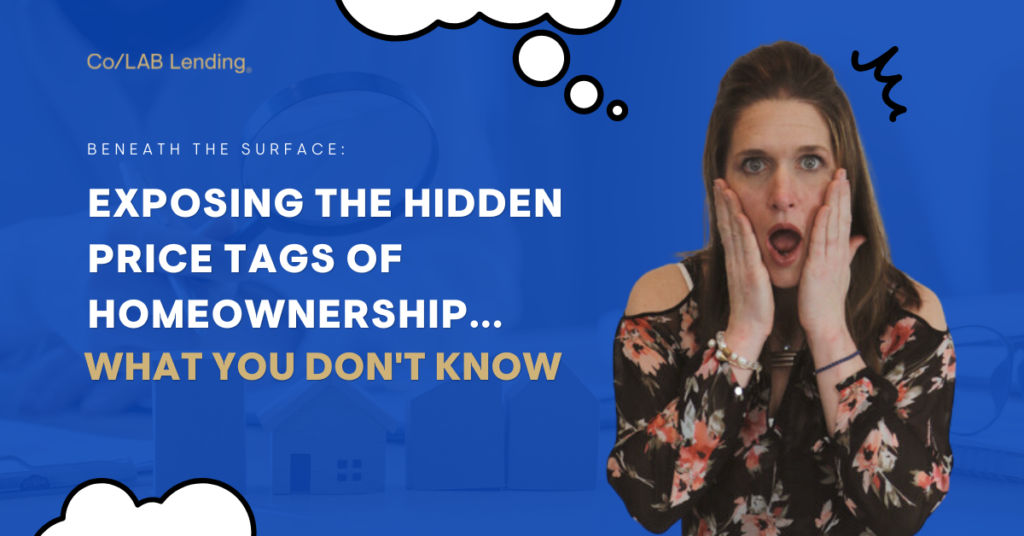Buying a home is an exciting chapter in one’s life. It shows progress, growth, and is at the crux of the American Dream. Furthermore, homeownership has some significant advantages over renting. But, what is the cost of home buying?
For instance, buying a home can:
- Provide you with a “nest egg” through your home equity
- Create a more predictable set of costs than renting does
- Allow for more tax deductions
With all the advantages of buying a home, it feels like a no-brainer to purchase one, and in many ways it is. However, it’s important to be financially ready to take that next step.
You may be thinking: I’ve seen lenders and brokers offering 3.5%, 1%, and even 0% down options. I can handle that! While undoubtedly, those are all great options, it’s imperative that you know about all of the other fees and unexpected costs that come with buying a home.
The cost of home buying includes:
Mortgage Payment Costs
Many home buyers only consider the down payment and the monthly mortgage payments when determining if they’re financially ready to buy a home. To do this, borrowers will look to online mortgage calculators to compute an estimate. Although these tools can be helpful, they leave a lot of variables out of the equation.
For example, private mortgage insurance (PMI), homeowners insurance (HOI), and property taxes are huge factors in the true cost of buying a home. Without a clear picture of how much these will add to your monthly payments, your estimate will be severely skewed.
The cost of PMI depends on the total amount of the loan, your down payment, and your credit score. With conventional loans, this lender protection is necessary for all homebuyers who put down less than 20%. In the case of an FHA loan, the PMI remains a monthly payment for the duration of the mortgage, but significantly decreases after eleven years if 10% or more has been paid.
Conventional 3.5% down: 700 credit with a $97,000 loan amount.
Estimated Cost: $82 per month
FHA 3.5% down: 700 credit with a $96,500 loan amount.
Estimate Cost: $68 per month.
Homeowners insurance also needs to be added into the mix. This liability coverage can vary widely in cost depending on your policy, the house being insured, and prior claims. That being said, the national average falls around $35 per month for every $100,000 of home value.
Estimate Cost: $35-$40 per month
Property taxes are often left out of the initial equation as they’re largely based off of location. In Pennsylvania, the median home value is $164,000, meaning the average tax on a home is around $2,223 annually (or $185 per month).
Estimated Cost: $185 per month
The Upfront Costs (Prior to Closing Day)
Although earnest money is not always necessary, this deposit allows buyers additional time to secure financing. The amount of this good-faith transaction depends on the current market, the home’s price tag, and the level of competition. Homes with multiple offers may require a larger deposit.
Estimated Cost: $1,000-$5,000
Home inspections ensure that a home’s main utilities, such as electrical, plumbing, heating, cooling, and overall structural integrity are in working order. Home inspections are not required but are highly recommended as they can provide protection for the buyer from making a costly mistake.
Estimated Cost: $300-$600
Another pre-closing cost is the home appraisal. This is an unbiased estimate of the value of the home. Lenders require an appraisal of the property to ensure they’re lending the borrower an appropriate loan amount.
Estimated Cost: $400-$550
Closing Day Costs
Property Tax rears its ugly head for a second round on closing day. Again, the cost will be based off the value of the property, so the amount can vary greatly. According to the U.S. Census Bureau, the typical household pays $2,127 per year in property taxes.
A tax assessor will determine the exact amount you owe on closing day. However, expect to pay one year’s worth of property taxes and an additional two to three months worth into an escrow account.
Estimate Cost (in PA): $2,172 + $543 = $2,715
Legal fees also come into the equation at closing time. Every real estate transaction will require the transfer of property to be completed by a lawyer. Title searches, title insurance, deed recording, escrow, and transfer tax fees can all apply. There is also a closing protection letter (CPL)—which indemnifies the lender for actual losses caused by the closing agent—and there may be other additional costs depending on your area.
Estimated Cost ($75,000 loan with 0% down): $3,300
Estimated Cost ($100,000 loan with 0% down): $4,100
Estimated Cost ($150,000 loan with 0% down): $5,500
Lastly, if you’re taking out a mortgage, you’ll be charged with lender fees for processing and financing the loan. This cost can vary widely as well. Be sure to ask your mortgage broker or lender to walk you through the cost for application, processing, recording, and other fees so you’re fully prepared.
Estimate Cost: $2,000-$4,000
How Much Does it Really Cost to Buy a Home?
Doing a cursory evaluation online is a good start, but it leaves much to be desired. When you factor in all the expenses, even a 0% down mortgage can cost you $5,000-$7,000 or more before you get the keys. Before you start looking at homes, it’s important that you determine whether or not you’re financially prepared to make the investment.
A good loan officer will provide you with an in-depth cost sheet that details all the fees that may accrue during the home buying process. By being smart and doing the necessary research, you’ll be much more apt to make a smart investment that will pay off for years to come.
By being smart and doing the necessary research, you’ll be much more apt to make a smart investment that will pay off for years to come.
